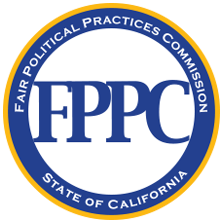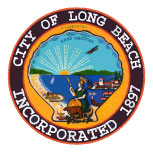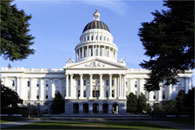September 10, 2019 •
FPPC Proposes Sponsored Committee Amendments
On October 18, the Fair Political Practices Commission (FPPC) will consider proposed amendments adding language to help determine when a committee reaches the 80% threshold for qualification as a sponsored committee. The threshold will be determined by all contributions received […]
On October 18, the Fair Political Practices Commission (FPPC) will consider proposed amendments adding language to help determine when a committee reaches the 80% threshold for qualification as a sponsored committee.
The threshold will be determined by all contributions received by a committee in the preceding 24 months.
A committee will also be required to determine if it qualifies as a sponsored committee, or if a sponsor changed, at the time of filing each campaign statement.
The proposed amendments would also provide additional guidance regarding the appropriate terms which should be used to describe the industry or group affiliation of multiple sponsors.
The FPPC is accepting written comments on the proposals until October 16, 2019.
November 19, 2018 •
FPPC Approves Cost of Living Adjustments for Gift Limits
On November 15, the California Fair Political Practices Commission approved proposed regulations to make biennial cost of living adjustments to campaign contribution and gift limits that will apply from January 1, 2019 through December 31, 2020. The proposed regulations would […]
 On November 15, the California Fair Political Practices Commission approved proposed regulations to make biennial cost of living adjustments to campaign contribution and gift limits that will apply from January 1, 2019 through December 31, 2020.
On November 15, the California Fair Political Practices Commission approved proposed regulations to make biennial cost of living adjustments to campaign contribution and gift limits that will apply from January 1, 2019 through December 31, 2020.
The proposed regulations would change the gift limit from $470 to $500 and make increases to campaign contribution limits for candidates.
Adjusted contribution limits for gubernatorial candidates would increase from $29,200 to $31,000.
November 7, 2018 •
Long Beach California Votes to Create an Ethics Commission
The City of Long Beach, California voted to establish a city ethics commission. Measure CCC creates an independent ethics commission charged with administering and implementing rules concerning campaign financing, lobbying, conflicts of interest and governmental ethics. The commission will also […]
 The City of Long Beach, California voted to establish a city ethics commission.
The City of Long Beach, California voted to establish a city ethics commission.
Measure CCC creates an independent ethics commission charged with administering and implementing rules concerning campaign financing, lobbying, conflicts of interest and governmental ethics.
The commission will also develop an educational program for candidates and lobbyists with the city.
The city’s agreement with the Fair Political Practices Commission to assist in the enforcement of local ethics laws remains in place.
September 24, 2018 •
California Bans Cryptocurrency Campaign Contributions
On September 20, the Fair Political Practices Commission prohibited the use of cryptocurrency in political contributions in California. The FPPC stated the anonymity of these donations would make it difficult to discern who is attempting to influence elections. This is […]
 On September 20, the Fair Political Practices Commission prohibited the use of cryptocurrency in political contributions in California.
On September 20, the Fair Political Practices Commission prohibited the use of cryptocurrency in political contributions in California.
The FPPC stated the anonymity of these donations would make it difficult to discern who is attempting to influence elections.
This is contrary to the position the Federal Election Commission took in 2014, which said cryptocurrencies are in-kind property and federal candidates could accept them as a form of contribution under certain conditions.
August 10, 2018 •
California FPPC to Consider Use of Cryptocurrency for Campaign Purposes
The Fair Political Practices Commission is considering changes to state campaign finance regulations. The commission was asked to consider the permissible use of cryptocurrency, such as Bitcoin, for campaign contributions and expenditures. Though similar to cash, such currency is not […]
 The Fair Political Practices Commission is considering changes to state campaign finance regulations.
The Fair Political Practices Commission is considering changes to state campaign finance regulations.
The commission was asked to consider the permissible use of cryptocurrency, such as Bitcoin, for campaign contributions and expenditures. Though similar to cash, such currency is not issued by a governmental entity.
Issues expected to be discussed at a public hearing include banning the use of cryptocurrency for campaign purposes, limiting cryptocurrency contributions to the amount of contributions received in cash, requiring cryptocurrency contributions to be converted to cash, permitting committees to establish separate cryptocurrency accounts, or permitting cryptocurrency contributions as in-kind contributions without regard to cash limits.
A public hearing will be held September 20, 2018; written comments should be received by September 18.
Under a California bill introduced on February 6, registered lobbyists could face suspension up to four years if found to have committed an act of sexual harassment. Assembly Bill 2055 requires the Fair Political Practices Commission to investigate sexual harassment […]
 Under a California bill introduced on February 6, registered lobbyists could face suspension up to four years if found to have committed an act of sexual harassment.
Under a California bill introduced on February 6, registered lobbyists could face suspension up to four years if found to have committed an act of sexual harassment.
Assembly Bill 2055 requires the Fair Political Practices Commission to investigate sexual harassment complaints made against registered lobbyists.
Sexual harassment would be defined as unwelcome sexual advances, requests for sexual favors, and other verbal, visual, or physical conduct of a sexual nature that arises out of or in the course of employment.
August 28, 2017 •
California Disclose Act Gets Closer to Passage
Assembly Bill 249, also known as the “California Disclose Act,” will be heard in the Senate on August 29. The bill requires most campaign ads to display their top three funders, even if those contributions were funneled through other committees. […]
 Assembly Bill 249, also known as the “California Disclose Act,” will be heard in the Senate on August 29. The bill requires most campaign ads to display their top three funders, even if those contributions were funneled through other committees.
Assembly Bill 249, also known as the “California Disclose Act,” will be heard in the Senate on August 29. The bill requires most campaign ads to display their top three funders, even if those contributions were funneled through other committees.
Similar versions of AB 249 have been introduced without passage since 2012. A similar bill from 2016 failed by one vote in the Senate. Last year’s bill was opposed by the California Fair Political Practice Commission (FPPC) due to the bill’s language making enforcement difficult.
The current version of the bill underwent changes to make the proposed law more acceptable to opponents and the FPPC has remained neutral.
August 17, 2017 •
FPPC Votes to Change Recall Election Campaign Finance Rule
On August 17, the Fair Political Practices Commission (FPPC) voted to reverse a longstanding rule that limited how much money politicians and their committees can give to a candidate-controlled recall committee. The 2002 FPPC opinion that was reversed by today’s […]
 On August 17, the Fair Political Practices Commission (FPPC) voted to reverse a longstanding rule that limited how much money politicians and their committees can give to a candidate-controlled recall committee.
On August 17, the Fair Political Practices Commission (FPPC) voted to reverse a longstanding rule that limited how much money politicians and their committees can give to a candidate-controlled recall committee.
The 2002 FPPC opinion that was reversed by today’s vote limited politician contributions to candidate-controlled recall committees to $4,400.
The rule change now allows politicians to give unlimited amounts of money to help fight the recall of Democratic Senator Josh Newman.
Chair Jodi Remke was the only dissenting commissioner in the 3-1 final vote.
October 21, 2016 •
FPPC Approves Amendment Affecting Nonprofit Reporting
On October 20, California’s Fair Political Practices Commission (FPPC) approved a regulation to provide further direction on how nonprofit organizations should report donor names relating to travel payments. The regulation creates Form 807 for the purpose of disclosing donor […]

On October 20, California’s Fair Political Practices Commission (FPPC) approved a regulation to provide further direction on how nonprofit organizations should report donor names relating to travel payments.
The regulation creates Form 807 for the purpose of disclosing donor information of nonprofits that regularly organize and host travel for elected officials. The regulation will become effective 30 days after the FPPC files it with the Office of the Secretary of State.
On November 17, the Fair Political Practices Commission (FPPC) will consider proposed regulations to make biennial cost of living adjustments to campaign contribution and gift limits that will apply from January 1, 2017 through December 31, 2018. The proposed regulations […]
 On November 17, the Fair Political Practices Commission (FPPC) will consider proposed regulations to make biennial cost of living adjustments to campaign contribution and gift limits that will apply from January 1, 2017 through December 31, 2018.
On November 17, the Fair Political Practices Commission (FPPC) will consider proposed regulations to make biennial cost of living adjustments to campaign contribution and gift limits that will apply from January 1, 2017 through December 31, 2018.
The proposed regulations would change the gift limit from $460 to $470 and make increases to campaign contribution limits.
The FPPC is accepting written comments on the proposals until November 15, 2016.
September 12, 2016 •
California’s FPPC Proposes Regulation Affecting Nonprofits
On October 20, California’s Fair Political Practices Commission (FPPC) will consider a proposed regulation to provide further direction on how nonprofit organizations should report donor names relating to travel payments. The proposed regulation would create Form 807 for the purpose […]
 On October 20, California’s Fair Political Practices Commission (FPPC) will consider a proposed regulation to provide further direction on how nonprofit organizations should report donor names relating to travel payments.
On October 20, California’s Fair Political Practices Commission (FPPC) will consider a proposed regulation to provide further direction on how nonprofit organizations should report donor names relating to travel payments.
The proposed regulation would create Form 807 for the purpose of disclosing donor information of nonprofits that regularly organize and host travel for elected officials.
The FPPC is accepting written comments on the proposal until October 18, 2016.
July 22, 2016 •
FPPC Approves Amendment to Lobbyist Regulation
On July 21, California’s Fair Political Practices Commission (FPPC) approved a regulation to further clarify the definition of “lobbyist.” The regulation creates a rebuttable presumption that all compensation from a person for services that include direct communication with a qualifying […]
 On July 21, California’s Fair Political Practices Commission (FPPC) approved a regulation to further clarify the definition of “lobbyist.”
On July 21, California’s Fair Political Practices Commission (FPPC) approved a regulation to further clarify the definition of “lobbyist.”
The regulation creates a rebuttable presumption that all compensation from a person for services that include direct communication with a qualifying official for the purpose of influencing legislative or administrative action received within a calendar month is for the purpose of direct compensation.
The regulation will become effective 30 days after the FPPC files it with the Office of the Secretary of State.
July 7, 2016 •
California FPPC to Review Political Reform Act
The California Fair Political Practices Commission (FPPC) has announced a project with the University of California and California Forward to update the Political Reform Act (PRA). The FPPC plans to submit revisions based on public input from this project to […]
 The California Fair Political Practices Commission (FPPC) has announced a project with the University of California and California Forward to update the Political Reform Act (PRA).
The California Fair Political Practices Commission (FPPC) has announced a project with the University of California and California Forward to update the Political Reform Act (PRA).
The FPPC plans to submit revisions based on public input from this project to the Legislature in 2017. A webinar is scheduled for Thursday, July 14, at 10 a.m. with FPPC Chair Jodi Remke to discuss the project. Interested persons can register for the webinar at www.cafwd.org/PRAtalk.
January 22, 2016 •
California’s FPPC Tightens Reporting Regulations
At its January 21, 2016, meeting, the Fair Political Practices Commission (FPPC) adopted rules amending reporting requirements for “other payments to influence legislative or administrative action”, as provided in California Government Code section 86116. The adopted regulations require such payments […]
 At its January 21, 2016, meeting, the Fair Political Practices Commission (FPPC) adopted rules amending reporting requirements for “other payments to influence legislative or administrative action”, as provided in California Government Code section 86116. The adopted regulations require such payments to be itemized on periodic disclosure reports.
At its January 21, 2016, meeting, the Fair Political Practices Commission (FPPC) adopted rules amending reporting requirements for “other payments to influence legislative or administrative action”, as provided in California Government Code section 86116. The adopted regulations require such payments to be itemized on periodic disclosure reports.
According to the FPPC, these payments encompass a range of expenditures and lump sum reporting does not provide the type of transparency imagined by the drafters of the statute. The amended regulations affect lobbyist employers and persons spending $5,000 or more to influence legislative or administrative action.
The rules become effective 30 days after they are filed with the Secretary of State.
State and Federal Communications, Inc. provides research and consulting services for government relations professionals on lobbying laws, procurement lobbying laws, political contribution laws in the United States and Canada. Learn more by visiting stateandfed.com.


